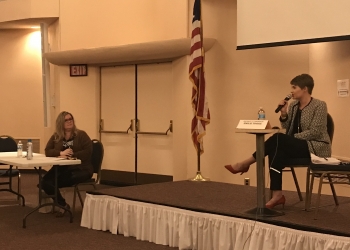News
Local News
Posted: Oct 20, 2020 9:51 PMUpdated: Oct 21, 2020 7:26 AM
Tindle Talks Education at PEAK Forum Tuesday Night

The Public Education Advocates for Kids (PEAK) held a forum on Tuesday night at the Bartlesville Community Center where Democrat candidate Emilie Tindle for House District 11 tackled a wide range of questions regarding education in Oklahoma. Republican candidate Wendi Stearman declined her invite to participate in the conversation. Dr. Keri Bostwick moderated the event.
Below are some of the questions Dr. Bostwick asked followed by Tindle's response:
Bostwick:
"What is the current state of public education in Oklahoma in your opinion?"
Tindle:
"From a regional comparison, we see some success from the last couple of years. I think we have all seen public education improve slightly, but it doesn't undo the damage because we still had 31-percent of a budget cut to public education since 2018. That's not even including higher education. There is a 25 to 28-percent budget cut to higher education. It's not much better there at all. That brings up the broken teacher pipeline. If we're not good now we're just going to get worse down the road because we are not going to have the right personnel to be able to get kids educated the way we need them to be. We need more university trained educators. I think there are people working really hard to work with what they've got. I think the legislature keeps punting the issue because it is not politically expedient unless you have the power of a teacher walk out like we saw in 2018 when it did become a top issue. For the past 10 to 12 years, we haven't seen any positive shifts so we continue to decrease nationally and regionally."
Bostwick:
"What ideas do you have about encouraging people to enter education in the state of Oklahoma with it being as you just described?"
Tindle:
"The first thing to do is to seperate what's going to happen in 2021 between the pandemic and the possible billion dollar budget shortfall. We can talk about the future but we also need to understand that we're tied to oil and gas at this very moment. Until we are able to diversify the economy, which itself is going to take some shifts and some changes and questioning about who we are as a state like what we bring and tax reforms as well, I think it's important to separate what we do next year from what we do in 10 years. We might not be able to do something in six months, but we can use the next couple years where we're going to be recovering to plan. We can plan to where we have additional successes and we can plan for when we have money. I think we have to understand that we are going to be in the planning phase for the next couple of years while we hold the line or education and ensure that there are as few cuts as possible at the state level. In an ideal world when we're past 2022 and we've recovered, we're looking at the potential for additional revenue to reinvest and diversify education. Teachers are professionals and they need to be treated professionally. That means safe work spaces and excellent pay for our teachers; it means teachers that are nationally board certified and teacher's that have master's degrees need to be compensated for that as well."
Bostwick:
"How much more money than is in the current state budget will it take to accomplish your goals of fixing the broken teacher pipeline, reduce class size and increase per pupil funding to a competitive regional rate?"
Tindle:
"That number changes every year. A flat budget a couple years now in a row becomes a decrease because inflation continues and because costs continue to rise, so education is not a one-and-done, it's a constant revision process... There's lots of different ways to access that funding. Unfortunately the biggest thing is that there would have to be tax code changes. That is not going to horribly impact middle class or lower class folks... We cannot afford to not invest in education because we already have seen a loss in jobs because of it. If we're not investing in education now, we're going to lose more jobs and businesses. Education investment is a must; it's a top priority. Language, arts, music need to be accounted for as well as STEM. STEM matches Oklahoma's economic strength in energy, but kids need these other educational experiences to stimulate other parts of their brains as well."
Bostwick:
"What separates you from your opponent Wendi Stearman when it comes to public education?"
Tindle:
"I'm working with teachers and I'm working with industrial professionals. Public education serves 92-percent of Oklahoma students and 95-percent of House District 11 students. At the end of the day the State Constitution that the legislature has to fund and create public schools and oversee public schools, so I think focusing on the fact that 95-percent of students are served in public schools in HD11 is what starts to separate myself from my opponent is the prioritization of the formal education most of our students receive versus treating them all as they're numerically equal in the district."
« Back to News

